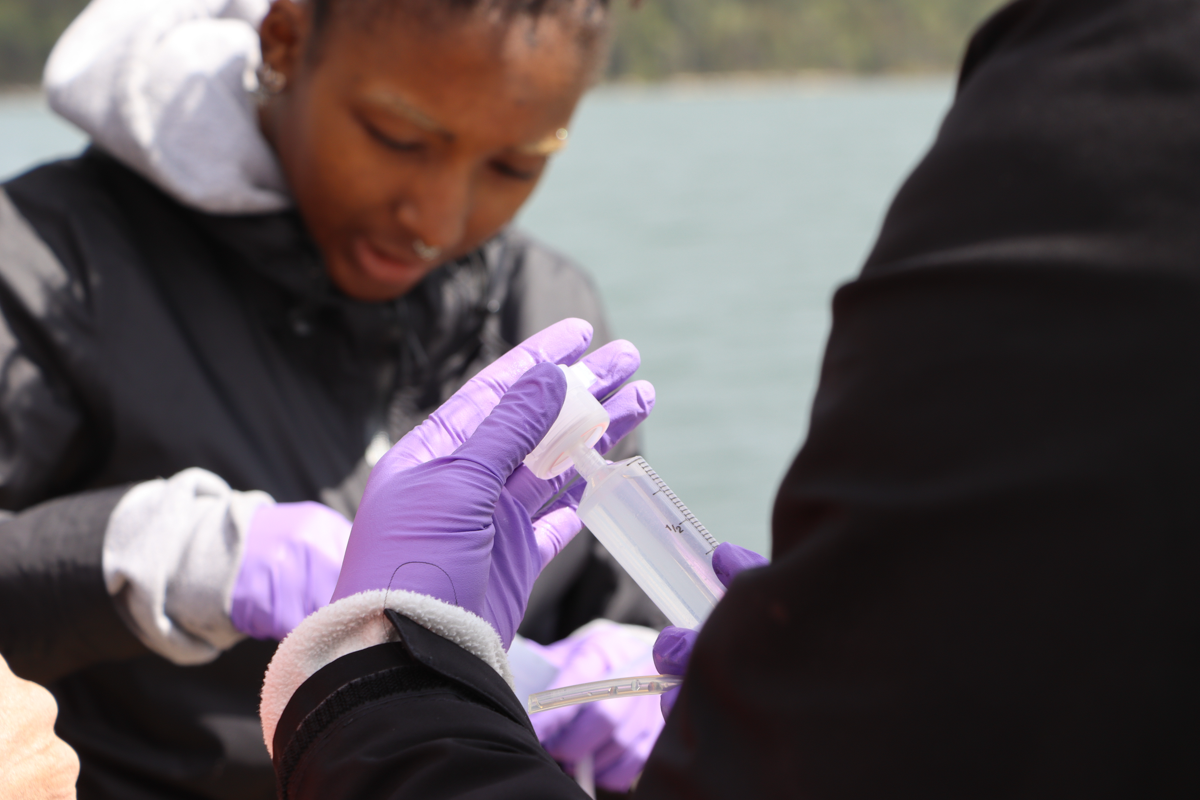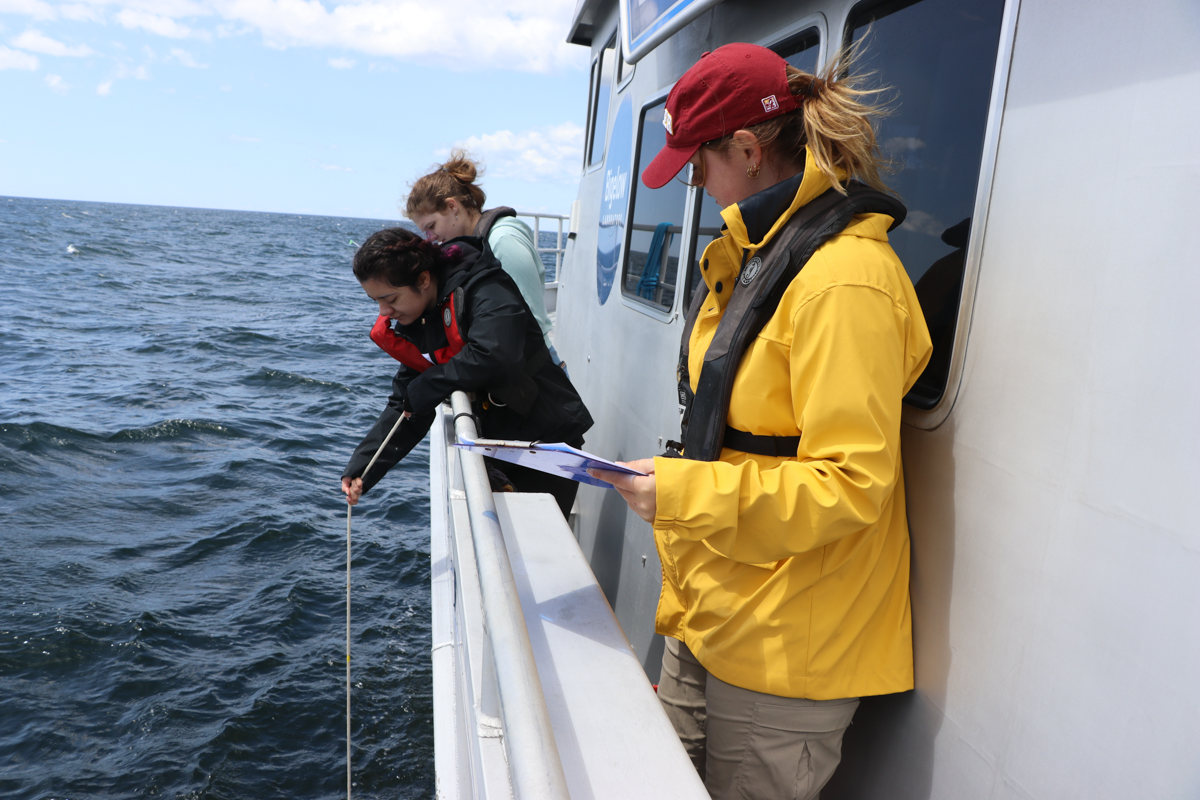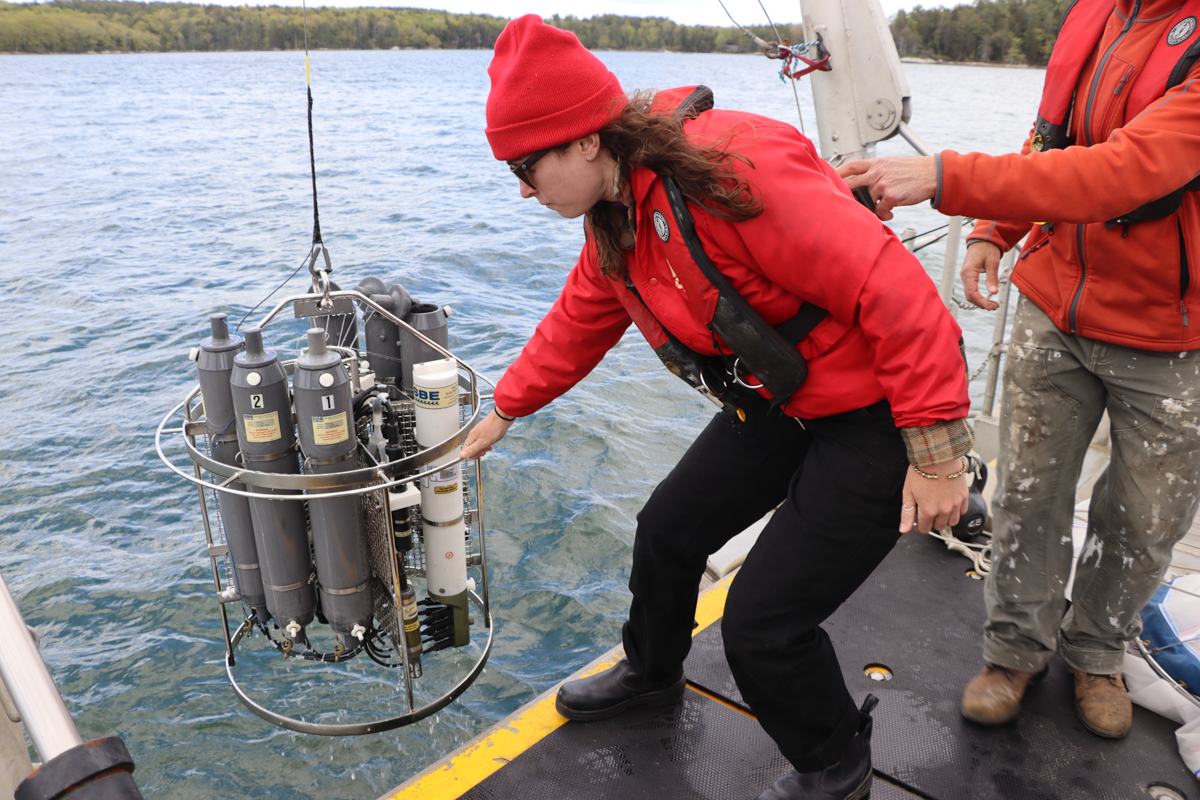New Boat Expands Education and Research Opportunities
This May, the R/V Bowditch set sail on its maiden voyage, providing 16 Maine high school students with hands-on research experience as part of Bigelow Laboratory’s Keller BLOOM program. A few weeks later, the institute’s summer interns set out on their own expedition to learn the ins and outs of ocean science.
Donated by Middlebury College last fall, the 48-foot research vessel will enhance Bigelow Laboratory’s educational programs, while also expanding research opportunities for scientists conducting work in the Gulf of Maine.
In the past, program leaders got students out on the water by chartering the R/V Ira C., a modified lobster boat operated by the University of Maine. But with the R/V Bowditch, Bigelow Laboratory scientists can now call upon the new vessel whenever they need it. It will allow groups to get out onto the water — and further offshore — faster and more easily adapt to changing weather conditions. And since it was built as a research vessel, the Bowditch already has dedicated lab space and sophisticated electronics on board.
That equipment has come in handy for participants in the summer internship program, directed by Senior Research Scientist David Fields. The program has a group science component where participants go out several times throughout the summer to test water quality, sampling everything from oxygen levels to bacteria counts to zooplankton populations.
Not only are they learning fundamental oceanography field methods, some of which they may need for their individual summer projects, they’re also adding to a long-running ocean health dataset. Fields began sampling along an established transect 12 years ago with participants in the Sea Change Semester program. With the R/V Bowditch, the interns and semester students can now keep that sampling going for almost half the year.

“When you look at textbooks and see a single datapoint, the value of that point can really hard to understand sometimes,” Fields said. “Out in the field, though, you get an appreciation for how science works, how complex it can be, and how difficult it can be to get that data.”
Leslie Palmer, a rising senior at Flagler College in Florida and summer intern at Bigelow Laboratory, can attest to how valuable the cruises aboard the R/V Bowditch have been for her.
“It was really cool to be part of what felt like real research and use all this instrumentation that I will probably use in my career,” said Palmer, who hopes to become a chemical oceanographer.
This summer, she’s working with Senior Research Scientist Christoph Aeppli, examining how oil breaks down in the sun and can accumulate in marine macroalgae. “There’s not a lot of fieldwork in my project, so this is a nice supplement,” she said of the intern research cruises. “It’s like I get to do two projects in the time that I’m here.”
Beyond the logistical advantages of the boat and the hands-on training students can get onboard, there are less-tangible benefits as well.

“Many students don’t understand how important teamwork is to science,” said Ben Twining, Bigelow Laboratory’s Vice President for Education. “That really comes home on the boat, where different people have different jobs.”
Twining said that being on the boat also teaches students about planning, safety, and taking responsibility for themselves and others — soft skills that are more important than ever coming out of the pandemic and years of remote learning.
In addition to the internship program and the Sea Change Semester, Twining said there are plans for other educational programs to use the boat in the coming months. For example, he hopes to take out marine science students from Colby College on weekend cruises this fall.
“It doesn’t need to be a month-long research cruise,” Twining said. “Getting students onto the water with scientists for even just a few hours is super powerful.”
Senior Research Associate and Marine Operations Coordinator Dave Drapeau is one of the boat’s two captains and has gotten to work closely with the students on their field experiences. He recently got the specialized license required to operate a boat of this size and led the effort to get the vessel ready for use — from applying for Coast Guard certifications to installing specialized equipment.

“This has been a really fun way to branch out and do some additional work outside of the science I’ve been doing for the last 27 years,” Drapeau said. “I think the Bowditch will also prove to be an invaluable resource for Bigelow Laboratory research.”
Fields, for example, plans to use the boat for a new project monitoring zooplankton around a federal leasing site for wind energy development. The sampling sites are more than 20 miles offshore. With the old boat they chartered, he said, it would take five hours just to get there, leaving little time for any actual research. With the R/V Bowditch, they can be out there in less than two.
Drapeau has been working with scientists like Fields and Twining to outfit the boat with specialized equipment they need for research. Twining needs specific plastic instruments to test for trace metals like iron for which very few measurements have been made in the Gulf of Maine. Others have spoken to Drapeau about installing equipment to take sediment cores or to get continuous, high-resolution images of phytoplankton offshore.
“To install that kind of instrumentation, we have to change some of the ship’s plumbing,” Twining said. “It’s difficult to do that on a boat that you’re just renting for the day, but, now that we have our own, we can actually make those enhancements.”
Twining said Bigelow Laboratory is providing funding to help researchers try the boat and test these kinds of modifications for their own work. The ultimate goal is for the R/V Bowditch to enable innovative new research focused on the Gulf of Maine and local waterways.

The acquisition of the boat is one of a series of exciting changes at Bigelow Laboratory, including a recently announced $30 million investment into a new center for ocean education and innovation and the creation of a dedicated marine educator position.
“I’m hoping that between the boat and the marine educator, and eventually the new center, all three of these will work together to be able to support a growing number of exciting new and external programs,” Twining said.

